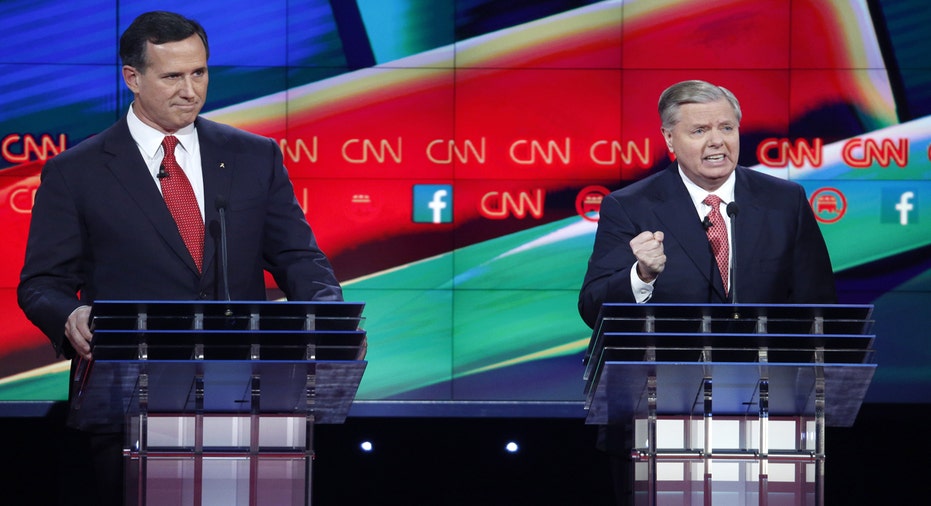GOP Candidates Get Tough on Terror in Undercard Debate

The latest Republican presidential primary debate, which was held Tuesday evening in Las Vegas, focused on a very timely topic; terrorism.
The four lower-polling candidates – former Pennsylvania Senator Rick Santorum, former Arkansas Governor Mike Huckabee, South Carolina Senator Lindsey Graham and former New York Governor George Pataki – were asked a number of terror and national security-related questions in light of the recent attacks in Paris, France and San Bernardino, California.
The debate kicked off with the moderator revisiting Republican frontrunner Donald Trump’s recent comments, made at a rally last week in South Carolina, on banning all Muslim immigrants to the United States. The candidates criticized his stance in one way or another, with Graham being the most hawkish.
“To all of our Muslim friends throughout the world…I am sorry. He [Trump] does not represent us,” Graham said.
“Please understand we're in a war that we can't afford to lose, and what he [Trump] said about banning Muslims coming here to America has made us all less safe, and it's the worst possible thing he could do in this war. He clearly doesn't understand this war and how to win it.”
But while the candidates disagreed with Trump’s proposal, they were unanimous in the opinion that he would make a better president than Hillary Clinton or Barack Obama.
“I think he will do a whole lot more to protect us than Hillary will. And a whole lot more than Barack Obama has done in his eight years,” Huckabee said. “People are angry and afraid that we are facing an enemy that this administration refuses to acknowledge.”
Defeating Terrorism at Home
Next on the agenda was a discussion about privacy and surveillance here in the United States. Specifically, candidates were asked if increased access to Americans’ phone data would protect the country from another terror attack.
While opinions were mixed, Huckabee turned the conversation toward the importance of monitoring social media in order to prevent the next terror attack.
“Let's also check out the Facebook posts, let's look at Twitter accounts…this lady [Tashfeen Malik] who came over here and shot up San Bernardino was posting things on Facebook, yet, we were restricted from looking,” he said.
Pataki was grilled on his proposal to keep tabs on Imams who are preaching violence and survey mosques around the country. He argued that the New York Police Department successfully prevented dozens of attacks in the state by monitoring certain Muslim communities.
Huckabee added, “If Islam is as wonderful, and peaceful as its adherents say, shouldn't they be begging us to all come in and listen to these peaceful sermons? Shouldn't they be begging us all to come, and listen, and bring the FBI so we'd all want to convert to Islam?”
The candidates agreed that Silicon Valley companies should change their business models so the government can better monitor traffic on cellphones. Last week, FBI Director James Comey made a similar request to the nation's biggest tech companies.
And, Santorum vehemently disagreed with a proposal to change a law that allows those on a terror watch list to legally purchase a gun in the U.S.
“I don't think we should be able to deny someone's constitutional rights based on a list kept by the government that nobody knows how they get on it, or how they get off of it...I think there has to be more transparency.”
Defeating Terrorism Abroad
The candidates were asked a number of questions about how they would defeat ISIS if elected president. Much back and forth revolved around putting U.S. troops on the ground in the Middle East, and if that would be a viable strategy.
“There must be American boots on the ground in Syria to win. If you don't understand that, you're not ready to be Commander-in-Chief,” Graham said.
He suggested forming a regional army of Arabs and Turks to destroy the ISIS caliphate, with 10% of that army comprised of U.S. troops.
Santorum argued that it was more important to train Syrian rebels and other local groups to fight ISIS, and take back land in Iraq. Pataki added that destroying ISIS training centers, recruitment centers and planning hubs is a priority.
Huckabee took this part of the debate to make a few interesting points, particularly when it comes to divulging how many troops the U.S. plans to send overseas.
“I think we make a mistake when we start telling the enemy what our limitations are…what we are willing and what we're unwilling to do. And that's one of the mistakes I believe that we're making militarily.”
He also criticized Millennials for expecting too much from the government, not doing enough for their country and not being invested in fighting terrorism.
“You know what we ought to tell young people? We aren't going to give you anything. We're giving you the opportunity to get off your butt and go serve your country and secure your freedom.”
The candidates unanimously agreed that Russian President Vladimir Putin should not be trusted and that Syrian President Bashar al-Assad, who Putin supports, must be ousted.
They also said there is no way to legitimately vet Syrian refugees trying to come into the U.S., and they should therefore be denied entry. Instead, the candidates proposed establishing refugee camps in the Middle East and a no-fly zone over Turkey so that the refugees have a safe haven.
Despite the disagreements on specific policies, all four men onstage closed out the debate by stressing the gravity of the current terrorism situation that the U.S. faces.
“The next president is going to be a war-time president, whether they like it or not,” Graham said.
Huckabee added, “The terrorists win when they make us change everything we do in our daily lives and alter our routines…And it is high time that we recognize that we have to take them out, not a little bit, but totally.”



















